MGBBT1TEN: Analyzing Sustainable Tourism Environment in Greece
VerifiedAdded on 2023/06/08
|9
|3040
|448
Essay
AI Summary
This essay provides a comprehensive analysis of the tourism environment and industry, focusing on sustainable tourism principles and their application in Greece. It identifies key stakeholders and their roles in developing sustainable tourism practices, examines the impact of macro-environmental factors on tourism development, and explores micro-environmental factors that motivate tourists. The essay emphasizes the importance of sustainable practices in preserving Greece's natural and cultural resources while contributing to its economy, highlighting the interconnectedness of environmental, social, and economic aspects of tourism. It concludes that tourism plays a crucial role in revenue generation for Greece and can be further enhanced through sustainable development and technological advancements.
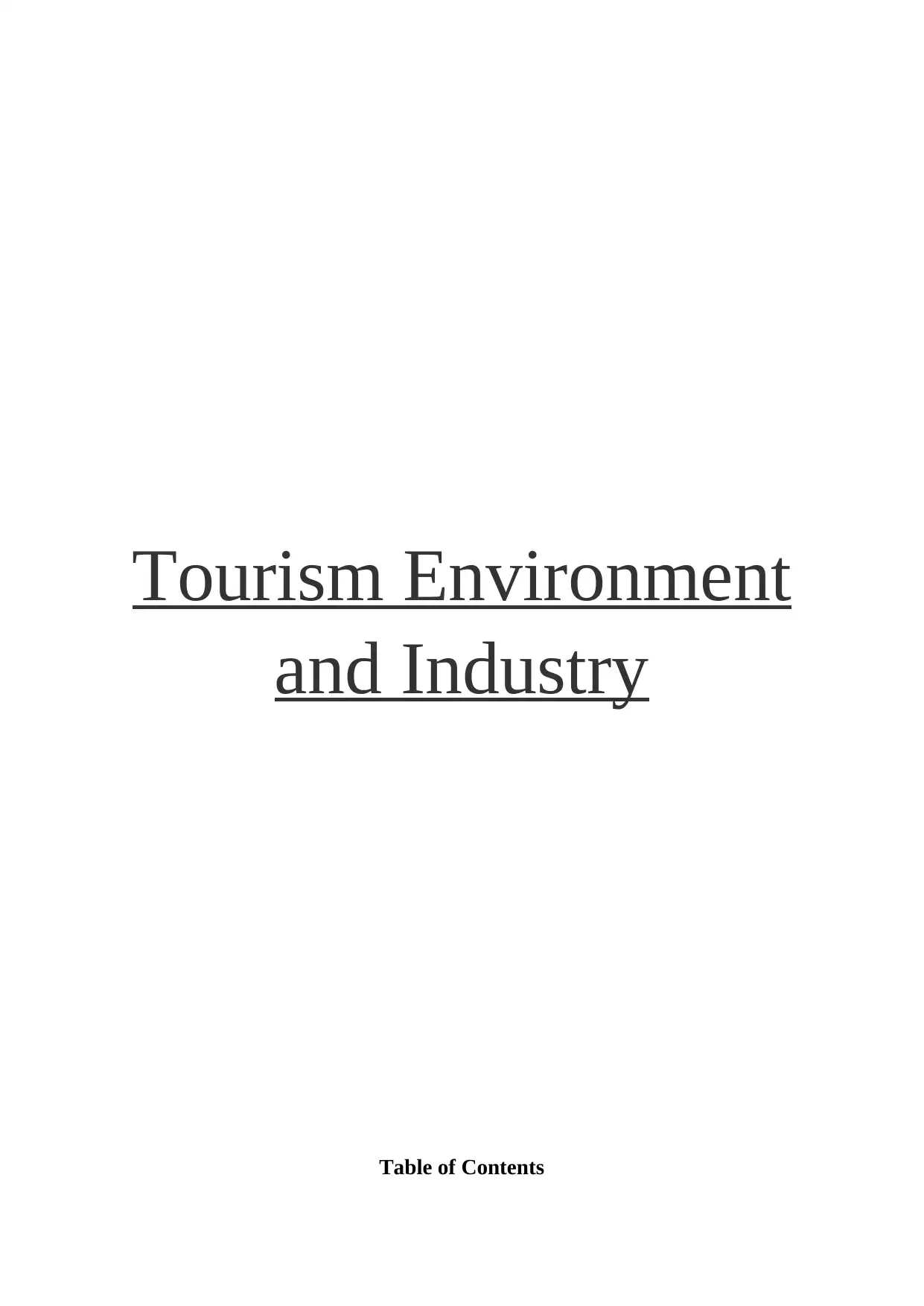
Tourism Environment
and Industry
Table of Contents
and Industry
Table of Contents
Paraphrase This Document
Need a fresh take? Get an instant paraphrase of this document with our AI Paraphraser

INTRODUCTION......................................................................................................................3
TASK 1......................................................................................................................................3
Sustainable tourism and its principles....................................................................................3
Task 2.........................................................................................................................................4
The role of stakeholders of sustaining the developed of tourism...........................................4
TASK 3......................................................................................................................................5
Macro environment factors contribution in development of tourism destination..................5
TASK 4......................................................................................................................................6
Micro-environment motivating factors that influence tourists...............................................6
CONCLUSION..........................................................................................................................7
REFERENCES...........................................................................................................................8
TASK 1......................................................................................................................................3
Sustainable tourism and its principles....................................................................................3
Task 2.........................................................................................................................................4
The role of stakeholders of sustaining the developed of tourism...........................................4
TASK 3......................................................................................................................................5
Macro environment factors contribution in development of tourism destination..................5
TASK 4......................................................................................................................................6
Micro-environment motivating factors that influence tourists...............................................6
CONCLUSION..........................................................................................................................7
REFERENCES...........................................................................................................................8

INTRODUCTION
Tourism is increasing rapidly as people are curious to travel and explore new places
and countries. As every place has different culture and due to this many people get attracted
to visit different places (Nikazachenko and et.al., 2018). Environmental factors have both
negative as well as positive impact on tourism sector of the country. Greece is one of the best
country one should visit. As it is known for its beaches and islands. The best time to visit
Greece is in springs when the weather is mild (Camilleri, 2018). The essay will aim at the
concept of sustainable tourism and its principles. Identification stakeholders role in making
decision regarding the development of tourism. Analysing the factors which contribute in
development and influencing the tourists to visit the place.
TASK 1
Sustainable tourism and its principles
Tourism is one of the key resource for the growth of economy of any country. Well
planned and effective tourism helps both visitors and local community of a place. There
comes the concept of sustainable tourism. Sustainable tourism basically aims on preservation
of environment and natural resources of a place so that visitors can enjoy and get the
knowledge of nature or local communities and local people can generate income by
participating in sustainable tourism by preserving local resources. Three components
comprises sustainable tourism on a major basis -
It contribute to the economy of any place by giving a source of income to local people
and stakeholders of tourism (Konovalova and et.al., 2018). It is more of a stable and
equitable source of income.
Through sustainable tourism less harm is occurred to natural resources and
environmental resources like plants, animal, and other resources.
Sustainable tourism restores the place’ social and culture structure of the local
community and other stakeholders. It involves stakeholders in the whole process and
training is also given to stakeholders about their roles.
Tourism is the backbone of the economy of Greece. Many visitors visit this place because
of its beautiful islands, scenic beauty and many more (Fong, Wong and Hong, 2018).
Sustainable tourism of Greece comprises of aspects of cultural tourism, agrotourism and
ecotourism.
Greece has many urban, sub- urban and rural areas. Rural areas are rich in natural
resources, culture and traditions and are most preferred by visitors. Visitors pay for this place
Tourism is increasing rapidly as people are curious to travel and explore new places
and countries. As every place has different culture and due to this many people get attracted
to visit different places (Nikazachenko and et.al., 2018). Environmental factors have both
negative as well as positive impact on tourism sector of the country. Greece is one of the best
country one should visit. As it is known for its beaches and islands. The best time to visit
Greece is in springs when the weather is mild (Camilleri, 2018). The essay will aim at the
concept of sustainable tourism and its principles. Identification stakeholders role in making
decision regarding the development of tourism. Analysing the factors which contribute in
development and influencing the tourists to visit the place.
TASK 1
Sustainable tourism and its principles
Tourism is one of the key resource for the growth of economy of any country. Well
planned and effective tourism helps both visitors and local community of a place. There
comes the concept of sustainable tourism. Sustainable tourism basically aims on preservation
of environment and natural resources of a place so that visitors can enjoy and get the
knowledge of nature or local communities and local people can generate income by
participating in sustainable tourism by preserving local resources. Three components
comprises sustainable tourism on a major basis -
It contribute to the economy of any place by giving a source of income to local people
and stakeholders of tourism (Konovalova and et.al., 2018). It is more of a stable and
equitable source of income.
Through sustainable tourism less harm is occurred to natural resources and
environmental resources like plants, animal, and other resources.
Sustainable tourism restores the place’ social and culture structure of the local
community and other stakeholders. It involves stakeholders in the whole process and
training is also given to stakeholders about their roles.
Tourism is the backbone of the economy of Greece. Many visitors visit this place because
of its beautiful islands, scenic beauty and many more (Fong, Wong and Hong, 2018).
Sustainable tourism of Greece comprises of aspects of cultural tourism, agrotourism and
ecotourism.
Greece has many urban, sub- urban and rural areas. Rural areas are rich in natural
resources, culture and traditions and are most preferred by visitors. Visitors pay for this place
⊘ This is a preview!⊘
Do you want full access?
Subscribe today to unlock all pages.

Trusted by 1+ million students worldwide

and local people can generate earnings. Cultural ecotourism has more to do with the historical
sites and places and history of Greece (Pencarelli, 2020). Ecotourism as its name suggests is
connected to living plants, animals , beautiful lakes, waterfalls , islands and it attracts many
people of young age.
Young age people like travelling very much as they want to get to know the natural
beauty of Greece. Greece is one of the dream places of many visitors. Agrotourism relates to
that time when holiday season is not there and is more concentrated in places with less
tourism and rush.
Sustainable tourism contributes in a major way to the economy of Greece. Since Greece
is most visited places it can derive many benefits from tourism. Local culture is also
encouraged as visitors pay for the local products.
Task 2
The role of stakeholders of sustaining the developed of tourism
Tourism involves interaction of local people and visitors of the place. There are various
stakeholders involved in the tourism industry. Stakeholders means any person or organization
who is involved in the project in some way (Bednarska, 2017). Stakeholders includes
government, tourists, non - government organizations, small and medium enterprises,
employees, transport and many more .They are the ones with who the tourism industry is
growing at a very rapid pace. Every stakeholder plays a different role in its own place (Li,
and Du, 2021). The role of each stakeholder is discussed below –
Government or Government organizations – It affects tourism industry indirectly. It
plays a big role in designing and shaping rules and regulations for any industry.
Employees – They are like freshers in the industry who passed out from tourism
educational institution. They are the ones who are going to take the industry forward.
They are going to implement the learning of current norms of industry (Yusof and
et.al., 2017). They act as a link between academics and industry.
Employers – They are the ones who are responsible for appointing the students who
recently passed out from tourism educational institution. They evaluate the qualities,
skills, knowledge of the prospective employees. It is very important for educational
institutions to understand the qualities and skills employer are looking for so that
students are ready for work as soon as they pass out.
Students – They act as a direct stakeholder as what they learn is how they are going to
implement it. It is very important for students to learn the skills and qualities required
sites and places and history of Greece (Pencarelli, 2020). Ecotourism as its name suggests is
connected to living plants, animals , beautiful lakes, waterfalls , islands and it attracts many
people of young age.
Young age people like travelling very much as they want to get to know the natural
beauty of Greece. Greece is one of the dream places of many visitors. Agrotourism relates to
that time when holiday season is not there and is more concentrated in places with less
tourism and rush.
Sustainable tourism contributes in a major way to the economy of Greece. Since Greece
is most visited places it can derive many benefits from tourism. Local culture is also
encouraged as visitors pay for the local products.
Task 2
The role of stakeholders of sustaining the developed of tourism
Tourism involves interaction of local people and visitors of the place. There are various
stakeholders involved in the tourism industry. Stakeholders means any person or organization
who is involved in the project in some way (Bednarska, 2017). Stakeholders includes
government, tourists, non - government organizations, small and medium enterprises,
employees, transport and many more .They are the ones with who the tourism industry is
growing at a very rapid pace. Every stakeholder plays a different role in its own place (Li,
and Du, 2021). The role of each stakeholder is discussed below –
Government or Government organizations – It affects tourism industry indirectly. It
plays a big role in designing and shaping rules and regulations for any industry.
Employees – They are like freshers in the industry who passed out from tourism
educational institution. They are the ones who are going to take the industry forward.
They are going to implement the learning of current norms of industry (Yusof and
et.al., 2017). They act as a link between academics and industry.
Employers – They are the ones who are responsible for appointing the students who
recently passed out from tourism educational institution. They evaluate the qualities,
skills, knowledge of the prospective employees. It is very important for educational
institutions to understand the qualities and skills employer are looking for so that
students are ready for work as soon as they pass out.
Students – They act as a direct stakeholder as what they learn is how they are going to
implement it. It is very important for students to learn the skills and qualities required
Paraphrase This Document
Need a fresh take? Get an instant paraphrase of this document with our AI Paraphraser
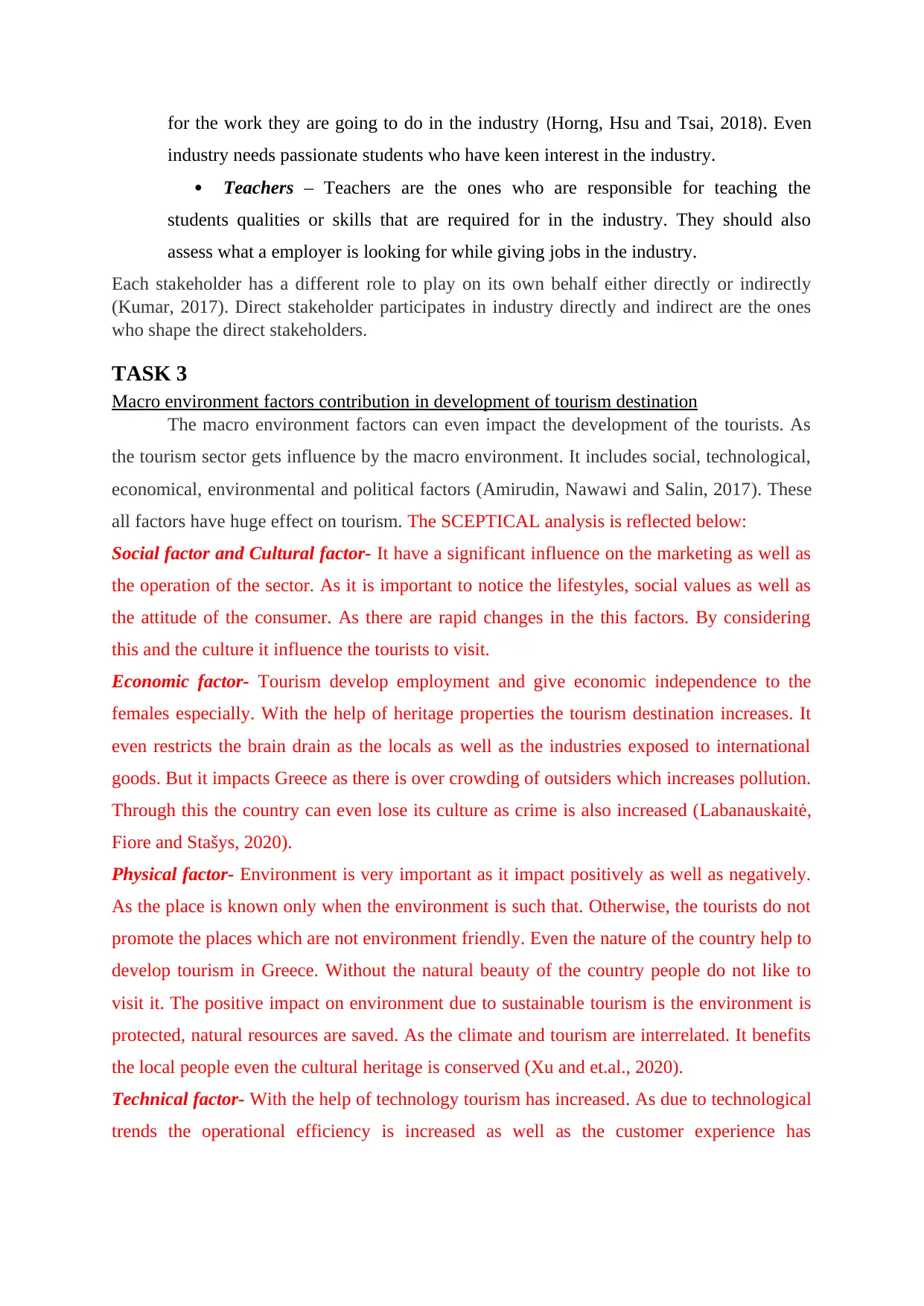
for the work they are going to do in the industry (Horng, Hsu and Tsai, 2018). Even
industry needs passionate students who have keen interest in the industry.
Teachers – Teachers are the ones who are responsible for teaching the
students qualities or skills that are required for in the industry. They should also
assess what a employer is looking for while giving jobs in the industry.
Each stakeholder has a different role to play on its own behalf either directly or indirectly
(Kumar, 2017). Direct stakeholder participates in industry directly and indirect are the ones
who shape the direct stakeholders.
TASK 3
Macro environment factors contribution in development of tourism destination
The macro environment factors can even impact the development of the tourists. As
the tourism sector gets influence by the macro environment. It includes social, technological,
economical, environmental and political factors (Amirudin, Nawawi and Salin, 2017). These
all factors have huge effect on tourism. The SCEPTICAL analysis is reflected below:
Social factor and Cultural factor- It have a significant influence on the marketing as well as
the operation of the sector. As it is important to notice the lifestyles, social values as well as
the attitude of the consumer. As there are rapid changes in the this factors. By considering
this and the culture it influence the tourists to visit.
Economic factor- Tourism develop employment and give economic independence to the
females especially. With the help of heritage properties the tourism destination increases. It
even restricts the brain drain as the locals as well as the industries exposed to international
goods. But it impacts Greece as there is over crowding of outsiders which increases pollution.
Through this the country can even lose its culture as crime is also increased (Labanauskaitė,
Fiore and Stašys, 2020).
Physical factor- Environment is very important as it impact positively as well as negatively.
As the place is known only when the environment is such that. Otherwise, the tourists do not
promote the places which are not environment friendly. Even the nature of the country help to
develop tourism in Greece. Without the natural beauty of the country people do not like to
visit it. The positive impact on environment due to sustainable tourism is the environment is
protected, natural resources are saved. As the climate and tourism are interrelated. It benefits
the local people even the cultural heritage is conserved (Xu and et.al., 2020).
Technical factor- With the help of technology tourism has increased. As due to technological
trends the operational efficiency is increased as well as the customer experience has
industry needs passionate students who have keen interest in the industry.
Teachers – Teachers are the ones who are responsible for teaching the
students qualities or skills that are required for in the industry. They should also
assess what a employer is looking for while giving jobs in the industry.
Each stakeholder has a different role to play on its own behalf either directly or indirectly
(Kumar, 2017). Direct stakeholder participates in industry directly and indirect are the ones
who shape the direct stakeholders.
TASK 3
Macro environment factors contribution in development of tourism destination
The macro environment factors can even impact the development of the tourists. As
the tourism sector gets influence by the macro environment. It includes social, technological,
economical, environmental and political factors (Amirudin, Nawawi and Salin, 2017). These
all factors have huge effect on tourism. The SCEPTICAL analysis is reflected below:
Social factor and Cultural factor- It have a significant influence on the marketing as well as
the operation of the sector. As it is important to notice the lifestyles, social values as well as
the attitude of the consumer. As there are rapid changes in the this factors. By considering
this and the culture it influence the tourists to visit.
Economic factor- Tourism develop employment and give economic independence to the
females especially. With the help of heritage properties the tourism destination increases. It
even restricts the brain drain as the locals as well as the industries exposed to international
goods. But it impacts Greece as there is over crowding of outsiders which increases pollution.
Through this the country can even lose its culture as crime is also increased (Labanauskaitė,
Fiore and Stašys, 2020).
Physical factor- Environment is very important as it impact positively as well as negatively.
As the place is known only when the environment is such that. Otherwise, the tourists do not
promote the places which are not environment friendly. Even the nature of the country help to
develop tourism in Greece. Without the natural beauty of the country people do not like to
visit it. The positive impact on environment due to sustainable tourism is the environment is
protected, natural resources are saved. As the climate and tourism are interrelated. It benefits
the local people even the cultural heritage is conserved (Xu and et.al., 2020).
Technical factor- With the help of technology tourism has increased. As due to technological
trends the operational efficiency is increased as well as the customer experience has
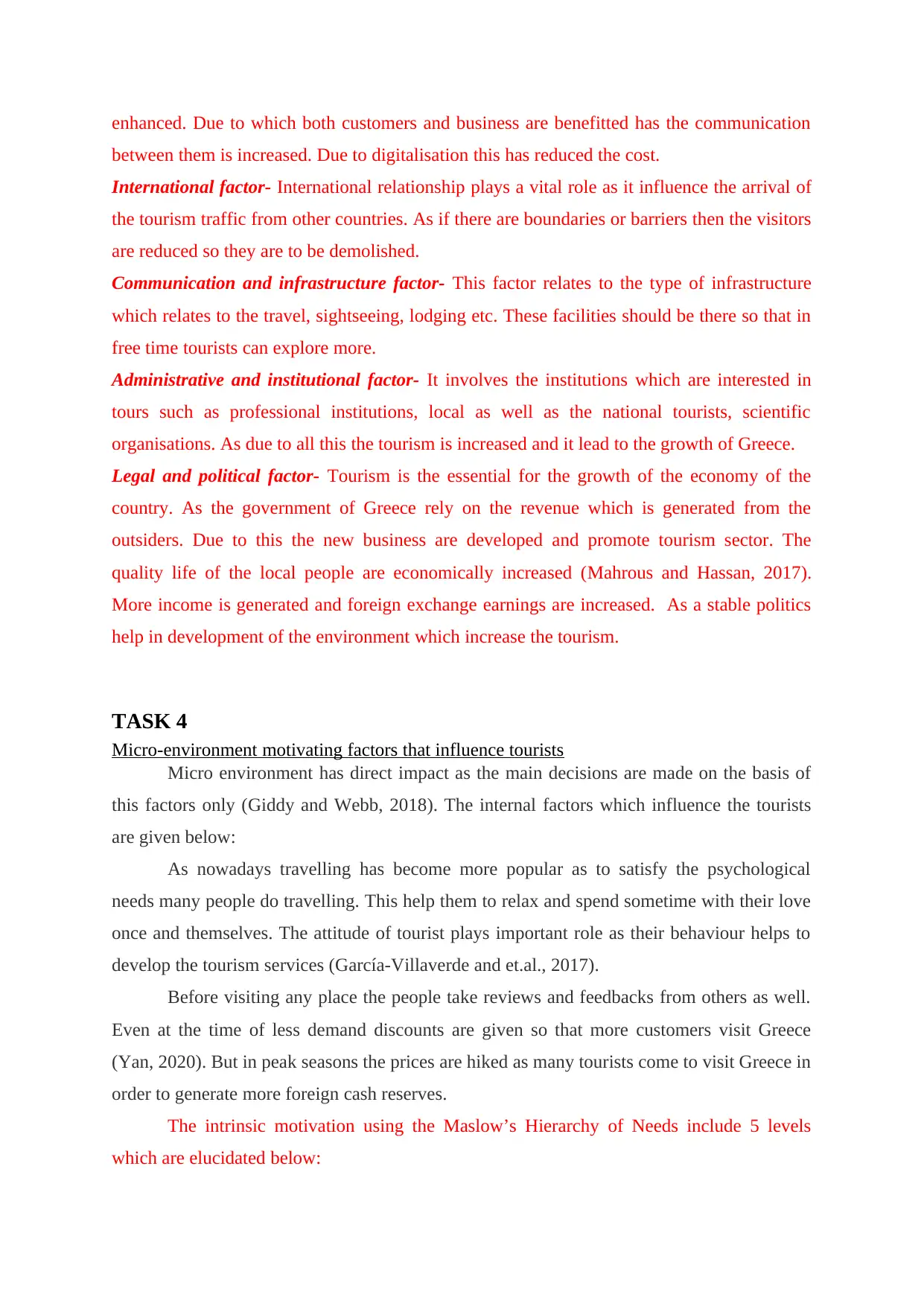
enhanced. Due to which both customers and business are benefitted has the communication
between them is increased. Due to digitalisation this has reduced the cost.
International factor- International relationship plays a vital role as it influence the arrival of
the tourism traffic from other countries. As if there are boundaries or barriers then the visitors
are reduced so they are to be demolished.
Communication and infrastructure factor- This factor relates to the type of infrastructure
which relates to the travel, sightseeing, lodging etc. These facilities should be there so that in
free time tourists can explore more.
Administrative and institutional factor- It involves the institutions which are interested in
tours such as professional institutions, local as well as the national tourists, scientific
organisations. As due to all this the tourism is increased and it lead to the growth of Greece.
Legal and political factor- Tourism is the essential for the growth of the economy of the
country. As the government of Greece rely on the revenue which is generated from the
outsiders. Due to this the new business are developed and promote tourism sector. The
quality life of the local people are economically increased (Mahrous and Hassan, 2017).
More income is generated and foreign exchange earnings are increased. As a stable politics
help in development of the environment which increase the tourism.
TASK 4
Micro-environment motivating factors that influence tourists
Micro environment has direct impact as the main decisions are made on the basis of
this factors only (Giddy and Webb, 2018). The internal factors which influence the tourists
are given below:
As nowadays travelling has become more popular as to satisfy the psychological
needs many people do travelling. This help them to relax and spend sometime with their love
once and themselves. The attitude of tourist plays important role as their behaviour helps to
develop the tourism services (García-Villaverde and et.al., 2017).
Before visiting any place the people take reviews and feedbacks from others as well.
Even at the time of less demand discounts are given so that more customers visit Greece
(Yan, 2020). But in peak seasons the prices are hiked as many tourists come to visit Greece in
order to generate more foreign cash reserves.
The intrinsic motivation using the Maslow’s Hierarchy of Needs include 5 levels
which are elucidated below:
between them is increased. Due to digitalisation this has reduced the cost.
International factor- International relationship plays a vital role as it influence the arrival of
the tourism traffic from other countries. As if there are boundaries or barriers then the visitors
are reduced so they are to be demolished.
Communication and infrastructure factor- This factor relates to the type of infrastructure
which relates to the travel, sightseeing, lodging etc. These facilities should be there so that in
free time tourists can explore more.
Administrative and institutional factor- It involves the institutions which are interested in
tours such as professional institutions, local as well as the national tourists, scientific
organisations. As due to all this the tourism is increased and it lead to the growth of Greece.
Legal and political factor- Tourism is the essential for the growth of the economy of the
country. As the government of Greece rely on the revenue which is generated from the
outsiders. Due to this the new business are developed and promote tourism sector. The
quality life of the local people are economically increased (Mahrous and Hassan, 2017).
More income is generated and foreign exchange earnings are increased. As a stable politics
help in development of the environment which increase the tourism.
TASK 4
Micro-environment motivating factors that influence tourists
Micro environment has direct impact as the main decisions are made on the basis of
this factors only (Giddy and Webb, 2018). The internal factors which influence the tourists
are given below:
As nowadays travelling has become more popular as to satisfy the psychological
needs many people do travelling. This help them to relax and spend sometime with their love
once and themselves. The attitude of tourist plays important role as their behaviour helps to
develop the tourism services (García-Villaverde and et.al., 2017).
Before visiting any place the people take reviews and feedbacks from others as well.
Even at the time of less demand discounts are given so that more customers visit Greece
(Yan, 2020). But in peak seasons the prices are hiked as many tourists come to visit Greece in
order to generate more foreign cash reserves.
The intrinsic motivation using the Maslow’s Hierarchy of Needs include 5 levels
which are elucidated below:
⊘ This is a preview!⊘
Do you want full access?
Subscribe today to unlock all pages.

Trusted by 1+ million students worldwide
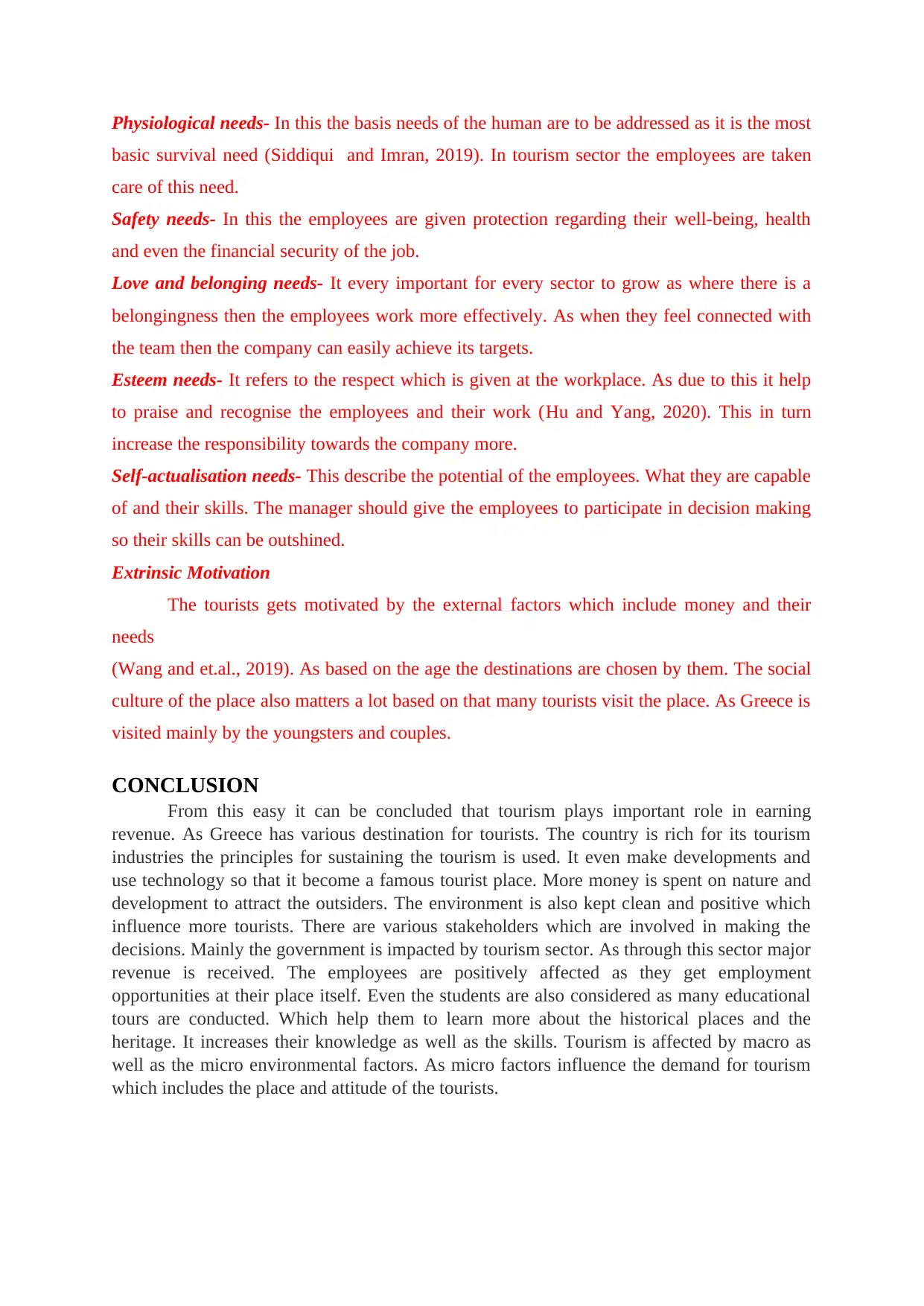
Physiological needs- In this the basis needs of the human are to be addressed as it is the most
basic survival need (Siddiqui and Imran, 2019). In tourism sector the employees are taken
care of this need.
Safety needs- In this the employees are given protection regarding their well-being, health
and even the financial security of the job.
Love and belonging needs- It every important for every sector to grow as where there is a
belongingness then the employees work more effectively. As when they feel connected with
the team then the company can easily achieve its targets.
Esteem needs- It refers to the respect which is given at the workplace. As due to this it help
to praise and recognise the employees and their work (Hu and Yang, 2020). This in turn
increase the responsibility towards the company more.
Self-actualisation needs- This describe the potential of the employees. What they are capable
of and their skills. The manager should give the employees to participate in decision making
so their skills can be outshined.
Extrinsic Motivation
The tourists gets motivated by the external factors which include money and their
needs
(Wang and et.al., 2019). As based on the age the destinations are chosen by them. The social
culture of the place also matters a lot based on that many tourists visit the place. As Greece is
visited mainly by the youngsters and couples.
CONCLUSION
From this easy it can be concluded that tourism plays important role in earning
revenue. As Greece has various destination for tourists. The country is rich for its tourism
industries the principles for sustaining the tourism is used. It even make developments and
use technology so that it become a famous tourist place. More money is spent on nature and
development to attract the outsiders. The environment is also kept clean and positive which
influence more tourists. There are various stakeholders which are involved in making the
decisions. Mainly the government is impacted by tourism sector. As through this sector major
revenue is received. The employees are positively affected as they get employment
opportunities at their place itself. Even the students are also considered as many educational
tours are conducted. Which help them to learn more about the historical places and the
heritage. It increases their knowledge as well as the skills. Tourism is affected by macro as
well as the micro environmental factors. As micro factors influence the demand for tourism
which includes the place and attitude of the tourists.
basic survival need (Siddiqui and Imran, 2019). In tourism sector the employees are taken
care of this need.
Safety needs- In this the employees are given protection regarding their well-being, health
and even the financial security of the job.
Love and belonging needs- It every important for every sector to grow as where there is a
belongingness then the employees work more effectively. As when they feel connected with
the team then the company can easily achieve its targets.
Esteem needs- It refers to the respect which is given at the workplace. As due to this it help
to praise and recognise the employees and their work (Hu and Yang, 2020). This in turn
increase the responsibility towards the company more.
Self-actualisation needs- This describe the potential of the employees. What they are capable
of and their skills. The manager should give the employees to participate in decision making
so their skills can be outshined.
Extrinsic Motivation
The tourists gets motivated by the external factors which include money and their
needs
(Wang and et.al., 2019). As based on the age the destinations are chosen by them. The social
culture of the place also matters a lot based on that many tourists visit the place. As Greece is
visited mainly by the youngsters and couples.
CONCLUSION
From this easy it can be concluded that tourism plays important role in earning
revenue. As Greece has various destination for tourists. The country is rich for its tourism
industries the principles for sustaining the tourism is used. It even make developments and
use technology so that it become a famous tourist place. More money is spent on nature and
development to attract the outsiders. The environment is also kept clean and positive which
influence more tourists. There are various stakeholders which are involved in making the
decisions. Mainly the government is impacted by tourism sector. As through this sector major
revenue is received. The employees are positively affected as they get employment
opportunities at their place itself. Even the students are also considered as many educational
tours are conducted. Which help them to learn more about the historical places and the
heritage. It increases their knowledge as well as the skills. Tourism is affected by macro as
well as the micro environmental factors. As micro factors influence the demand for tourism
which includes the place and attitude of the tourists.
Paraphrase This Document
Need a fresh take? Get an instant paraphrase of this document with our AI Paraphraser
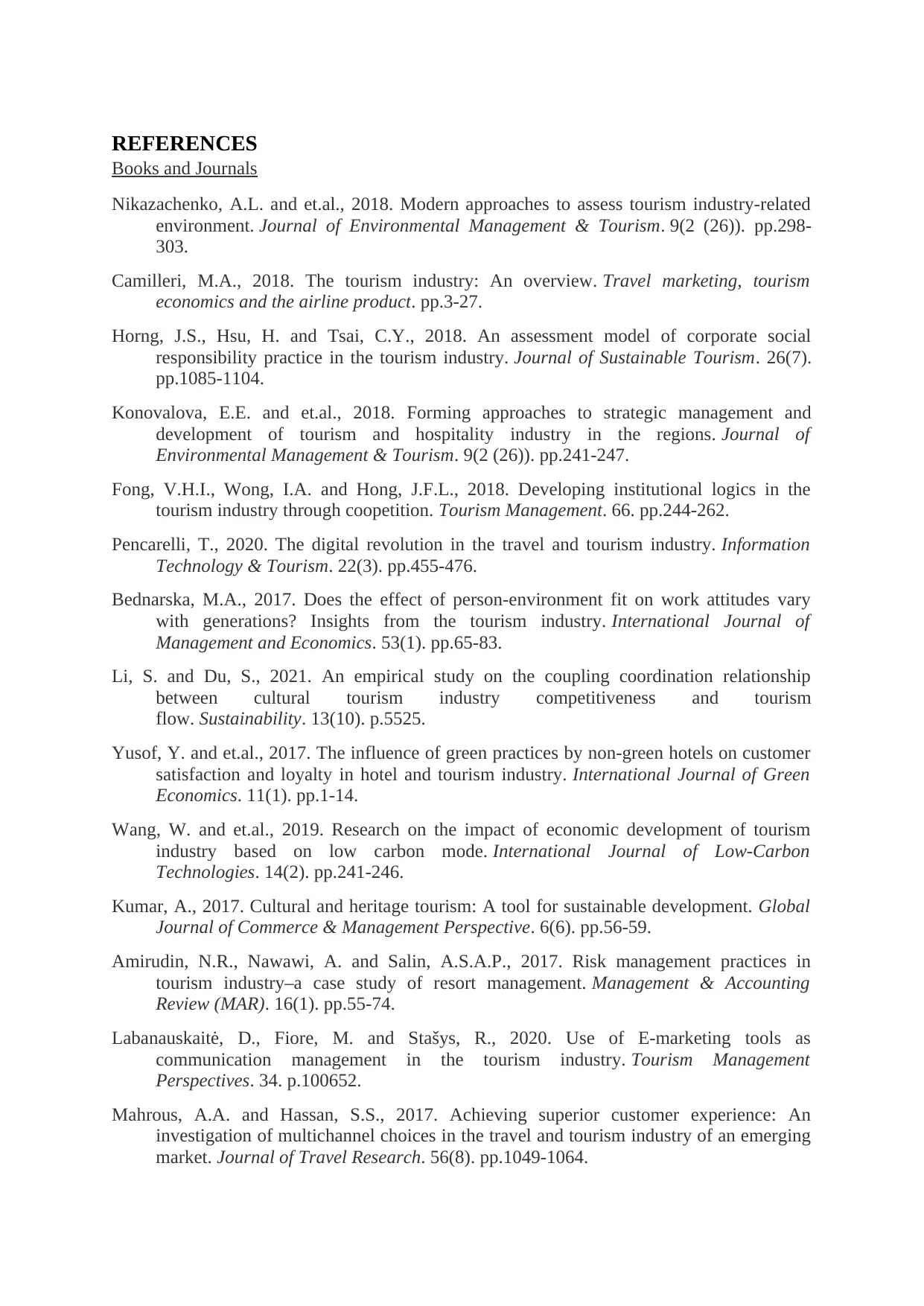
REFERENCES
Books and Journals
Nikazachenko, A.L. and et.al., 2018. Modern approaches to assess tourism industry-related
environment. Journal of Environmental Management & Tourism. 9(2 (26)). pp.298-
303.
Camilleri, M.A., 2018. The tourism industry: An overview. Travel marketing, tourism
economics and the airline product. pp.3-27.
Horng, J.S., Hsu, H. and Tsai, C.Y., 2018. An assessment model of corporate social
responsibility practice in the tourism industry. Journal of Sustainable Tourism. 26(7).
pp.1085-1104.
Konovalova, E.E. and et.al., 2018. Forming approaches to strategic management and
development of tourism and hospitality industry in the regions. Journal of
Environmental Management & Tourism. 9(2 (26)). pp.241-247.
Fong, V.H.I., Wong, I.A. and Hong, J.F.L., 2018. Developing institutional logics in the
tourism industry through coopetition. Tourism Management. 66. pp.244-262.
Pencarelli, T., 2020. The digital revolution in the travel and tourism industry. Information
Technology & Tourism. 22(3). pp.455-476.
Bednarska, M.A., 2017. Does the effect of person-environment fit on work attitudes vary
with generations? Insights from the tourism industry. International Journal of
Management and Economics. 53(1). pp.65-83.
Li, S. and Du, S., 2021. An empirical study on the coupling coordination relationship
between cultural tourism industry competitiveness and tourism
flow. Sustainability. 13(10). p.5525.
Yusof, Y. and et.al., 2017. The influence of green practices by non-green hotels on customer
satisfaction and loyalty in hotel and tourism industry. International Journal of Green
Economics. 11(1). pp.1-14.
Wang, W. and et.al., 2019. Research on the impact of economic development of tourism
industry based on low carbon mode. International Journal of Low-Carbon
Technologies. 14(2). pp.241-246.
Kumar, A., 2017. Cultural and heritage tourism: A tool for sustainable development. Global
Journal of Commerce & Management Perspective. 6(6). pp.56-59.
Amirudin, N.R., Nawawi, A. and Salin, A.S.A.P., 2017. Risk management practices in
tourism industry–a case study of resort management. Management & Accounting
Review (MAR). 16(1). pp.55-74.
Labanauskaitė, D., Fiore, M. and Stašys, R., 2020. Use of E-marketing tools as
communication management in the tourism industry. Tourism Management
Perspectives. 34. p.100652.
Mahrous, A.A. and Hassan, S.S., 2017. Achieving superior customer experience: An
investigation of multichannel choices in the travel and tourism industry of an emerging
market. Journal of Travel Research. 56(8). pp.1049-1064.
Books and Journals
Nikazachenko, A.L. and et.al., 2018. Modern approaches to assess tourism industry-related
environment. Journal of Environmental Management & Tourism. 9(2 (26)). pp.298-
303.
Camilleri, M.A., 2018. The tourism industry: An overview. Travel marketing, tourism
economics and the airline product. pp.3-27.
Horng, J.S., Hsu, H. and Tsai, C.Y., 2018. An assessment model of corporate social
responsibility practice in the tourism industry. Journal of Sustainable Tourism. 26(7).
pp.1085-1104.
Konovalova, E.E. and et.al., 2018. Forming approaches to strategic management and
development of tourism and hospitality industry in the regions. Journal of
Environmental Management & Tourism. 9(2 (26)). pp.241-247.
Fong, V.H.I., Wong, I.A. and Hong, J.F.L., 2018. Developing institutional logics in the
tourism industry through coopetition. Tourism Management. 66. pp.244-262.
Pencarelli, T., 2020. The digital revolution in the travel and tourism industry. Information
Technology & Tourism. 22(3). pp.455-476.
Bednarska, M.A., 2017. Does the effect of person-environment fit on work attitudes vary
with generations? Insights from the tourism industry. International Journal of
Management and Economics. 53(1). pp.65-83.
Li, S. and Du, S., 2021. An empirical study on the coupling coordination relationship
between cultural tourism industry competitiveness and tourism
flow. Sustainability. 13(10). p.5525.
Yusof, Y. and et.al., 2017. The influence of green practices by non-green hotels on customer
satisfaction and loyalty in hotel and tourism industry. International Journal of Green
Economics. 11(1). pp.1-14.
Wang, W. and et.al., 2019. Research on the impact of economic development of tourism
industry based on low carbon mode. International Journal of Low-Carbon
Technologies. 14(2). pp.241-246.
Kumar, A., 2017. Cultural and heritage tourism: A tool for sustainable development. Global
Journal of Commerce & Management Perspective. 6(6). pp.56-59.
Amirudin, N.R., Nawawi, A. and Salin, A.S.A.P., 2017. Risk management practices in
tourism industry–a case study of resort management. Management & Accounting
Review (MAR). 16(1). pp.55-74.
Labanauskaitė, D., Fiore, M. and Stašys, R., 2020. Use of E-marketing tools as
communication management in the tourism industry. Tourism Management
Perspectives. 34. p.100652.
Mahrous, A.A. and Hassan, S.S., 2017. Achieving superior customer experience: An
investigation of multichannel choices in the travel and tourism industry of an emerging
market. Journal of Travel Research. 56(8). pp.1049-1064.
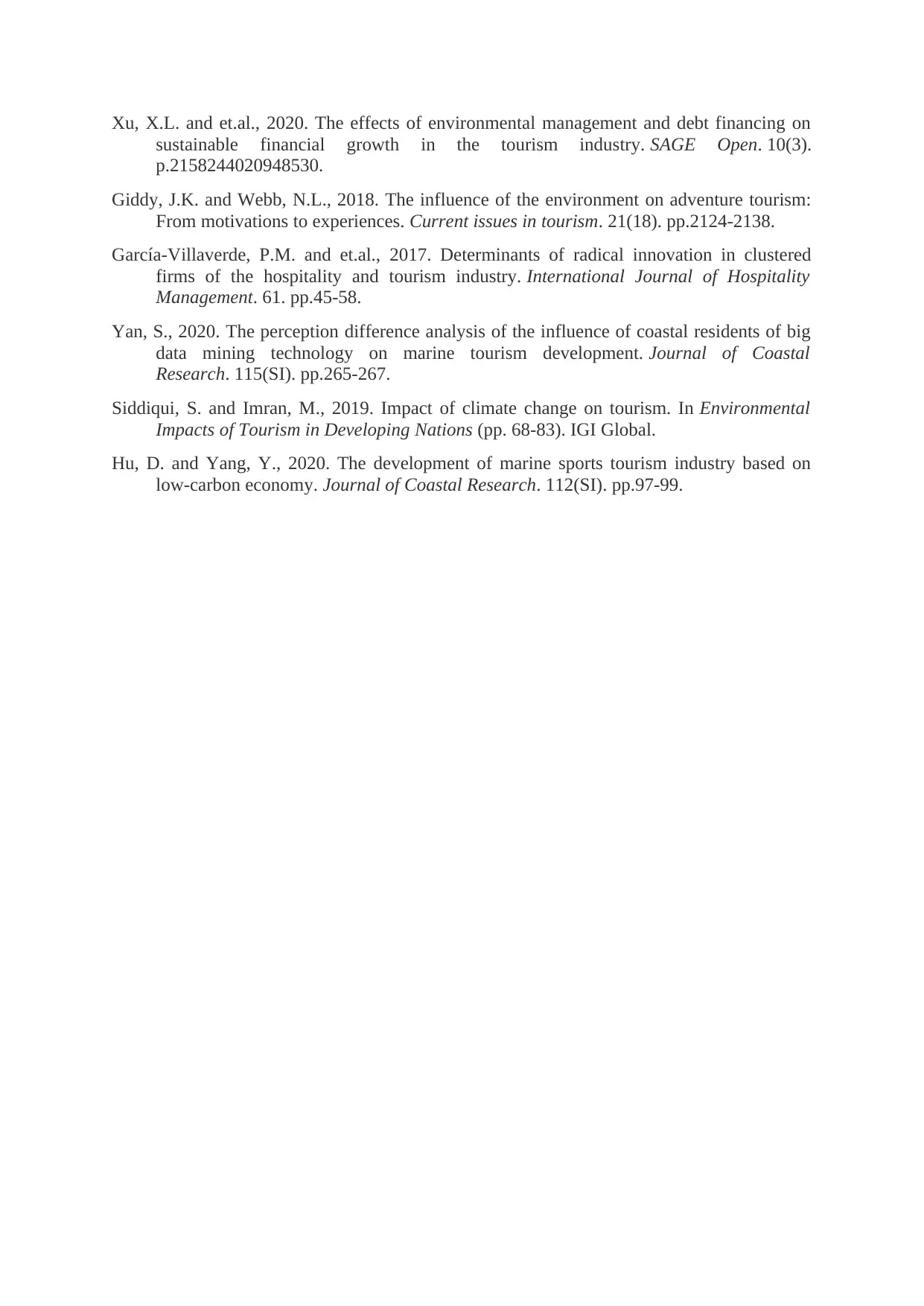
Xu, X.L. and et.al., 2020. The effects of environmental management and debt financing on
sustainable financial growth in the tourism industry. SAGE Open. 10(3).
p.2158244020948530.
Giddy, J.K. and Webb, N.L., 2018. The influence of the environment on adventure tourism:
From motivations to experiences. Current issues in tourism. 21(18). pp.2124-2138.
García-Villaverde, P.M. and et.al., 2017. Determinants of radical innovation in clustered
firms of the hospitality and tourism industry. International Journal of Hospitality
Management. 61. pp.45-58.
Yan, S., 2020. The perception difference analysis of the influence of coastal residents of big
data mining technology on marine tourism development. Journal of Coastal
Research. 115(SI). pp.265-267.
Siddiqui, S. and Imran, M., 2019. Impact of climate change on tourism. In Environmental
Impacts of Tourism in Developing Nations (pp. 68-83). IGI Global.
Hu, D. and Yang, Y., 2020. The development of marine sports tourism industry based on
low-carbon economy. Journal of Coastal Research. 112(SI). pp.97-99.
sustainable financial growth in the tourism industry. SAGE Open. 10(3).
p.2158244020948530.
Giddy, J.K. and Webb, N.L., 2018. The influence of the environment on adventure tourism:
From motivations to experiences. Current issues in tourism. 21(18). pp.2124-2138.
García-Villaverde, P.M. and et.al., 2017. Determinants of radical innovation in clustered
firms of the hospitality and tourism industry. International Journal of Hospitality
Management. 61. pp.45-58.
Yan, S., 2020. The perception difference analysis of the influence of coastal residents of big
data mining technology on marine tourism development. Journal of Coastal
Research. 115(SI). pp.265-267.
Siddiqui, S. and Imran, M., 2019. Impact of climate change on tourism. In Environmental
Impacts of Tourism in Developing Nations (pp. 68-83). IGI Global.
Hu, D. and Yang, Y., 2020. The development of marine sports tourism industry based on
low-carbon economy. Journal of Coastal Research. 112(SI). pp.97-99.
⊘ This is a preview!⊘
Do you want full access?
Subscribe today to unlock all pages.

Trusted by 1+ million students worldwide
1 out of 9
Related Documents
Your All-in-One AI-Powered Toolkit for Academic Success.
+13062052269
info@desklib.com
Available 24*7 on WhatsApp / Email
![[object Object]](/_next/static/media/star-bottom.7253800d.svg)
Unlock your academic potential
Copyright © 2020–2025 A2Z Services. All Rights Reserved. Developed and managed by ZUCOL.



